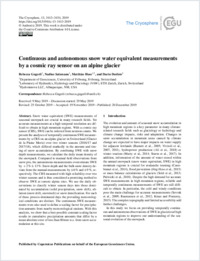Continuous and autonomous snow water equivalent measurements by a cosmic ray sensor on an alpine glacier
- Gugerli, Rebecca Department of Geosciences, University of Fribourg, Switzerland
- Salzmann, Nadine Department of Geosciences, University of Fribourg, Switzerland
- Huss, Matthias Department of Geosciences, University of Fribourg, Switzerland - Laboratory of Hydraulics, Hydrology and Glaciology (VAW), ETH Zurich, Switzerland
- Desilets, Darin Hydroinnova LLC, Albuquerque, NM, USA
-
20.12.2019
Published in:
- The Cryosphere. - 2019, vol. 13, no. 12, p. 3413–3434
English
Snow water equivalent (SWE) measurements of seasonal snowpack are crucial in many research fields. Yet accurate measurements at a high temporal resolution are difficult to obtain in high mountain regions. With a cosmic ray sensor (CRS), SWE can be inferred from neutron counts. We present the analyses of temporally continuous SWE measurements by a CRS on an alpine glacier in Switzerland (Glacier de la Plaine Morte) over two winter seasons (2016/17 and 2017/18), which differed markedly in the amount and timing of snow accumulation. By combining SWE with snow depth measurements, we calculate the daily mean density of the snowpack. Compared to manual field observations from snow pits, the autonomous measurements overestimate SWE by +2 % ± 13 %. Snow depth and the bulk snow density deviate from the manual measurements by ±6 % and ±9 %, respectively. The CRS measured with high reliability over two winter seasons and is thus considered a promising method to observe SWE at remote alpine sites. We use the daily observations to classify winter season days into those dominated by accumulation (solid precipitation, snow drift), ablation (snow drift, snowmelt) or snow densification. For each of these process-dominated days the prevailing meteorological conditions are distinct. The continuous SWE measurements were also used to define a scaling factor for precipitation amounts from nearby meteorological stations. With this analysis, we show that a best-possible constant scaling factor results in cumulative precipitation amounts that differ by a mean absolute error of less than 80 mm w.e. from snow accumulation at this site.
- Faculty
- Faculté des sciences et de médecine
- Department
- Département de Géosciences
- Language
-
- English
- Classification
- Hydrology
- License
-
License undefined
- Identifiers
-
- RERO DOC 328025
- DOI 10.5194/tc-13-3413-2019
- Persistent URL
- https://folia.unifr.ch/unifr/documents/308363
Statistics
Document views: 165
File downloads:
- pdf: 221
